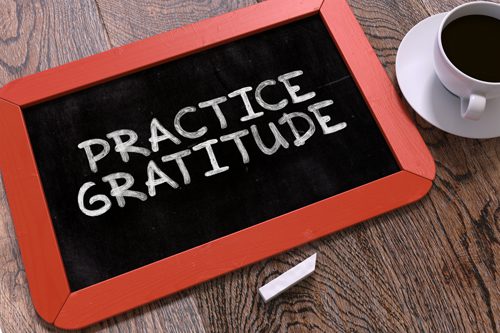
Attitudes
It’s easy to feel an attitude of judgment from the people who lecture you to be grateful; when someone says, “Stop feeling sorry for yourself,” our response is probably not going to be positive.
Instead of trying to sound preachy, the purpose of this post is to discuss the benefits of gratitude and to suggest practical ways to develop thankfulness—not because it’s the right thing to do, but because it will empower you in ways you may not think possible.
A Clarification
Let’s be clear about one thing: being grateful does not mean ignoring your problems, compartmentalizing them, or denying them altogether. It doesn’t mean that being sad is wrong or that feeling anger toward perceived injustice is wrong.
It’s important to acknowledge what you’re feeling, allow the emotion to pass through you, and to consider whether there is a bigger problem that triggers the emotion. It’s important to learn how to constructively communicate what you’re feeling, and to seek professional help if necessary.
The Many Benefits of Gratitude
Still, in day-to-day practice, being grateful can boost your emotional and physical health and make you more resilient in the face of pain.
Psychology Today lists numerous benefits of gratitude:
- Improves physical health and makes you more likely to take care of your health
- Reduces power of toxic emotions and depression; enhances empathy
- Can improve sleep
- Improves self-esteem by reducing the tendency to compare yourself to others
- Reduces stress and assists in overcoming trauma
So…let’s talk about some practical ways to cultivate gratitude in your life. First, and most basic, is to say thank you to those who do nice things for you. Looking people in the eye, smiling, and saying thank you strengthens relationships and can attract new friendships. Now and then, write a note or make a small gift to say thank you.
Make a list (in your head or on paper) at the beginning and end of each day of what you’re grateful for. What went well that day? What do you take for granted? Try feeling grateful for even little things: your car not breaking down, your comfortable bed, your warm coat, the short line at the grocery store. Give thanks for the people who love you, the good health you’re discovering in recovery, the clear head you wake up with in the morning.
Say thank you for good outcomes that haven’t happened yet. This is where it gets radical. Thank you that my spouse will get home safely tonight. Thank you that I’ll find a job that I’ll enjoy. Thank you that my child will get a good teacher this year. When you practice cultivating thankfulness for outcomes you desire, you might be surprised at what manifests. Expect the miracle.
When possible, change “I should” to “I want to.” I want to do the laundry. I want to walk the dog. I want to stay late at work tonight. I want to be grateful. Even if you don’t feel like you want to do any of those things, changing the language will subtly change your mindset and foster gratitude.
Set aside some time each day, week, or month to focus your energy and attention on others; this might mean that you visit a relative in a hospital or nursing home, write a letter to a friend, wash your mom’s car, or offer to babysit a neighbor’s kids for an hour so she can go grocery shopping. Give others something to add to their daily list of gratitude.
In the end, practicing gratitude will strengthen your mental and emotional stamina. You will rule your thoughts and emotions instead of being controlled by them. And the feeling of empowerment you’ll have when you can shift your state of mind into a more positive, grateful one? You’ll feel like a super-hero, and you will be. Being in control of your attitude is one of the hardest lessons we can learn—and the most rewarding.
Remember, as always, to have compassion toward yourself and others. You won’t always be able to change your attitude. You won’t always remember to or even want to be grateful. Sometimes negative thoughts and emotions will overpower you. Don’t beat yourself up. Recognize your behavior, make amends if necessary, and then continue to practice gratitude.
